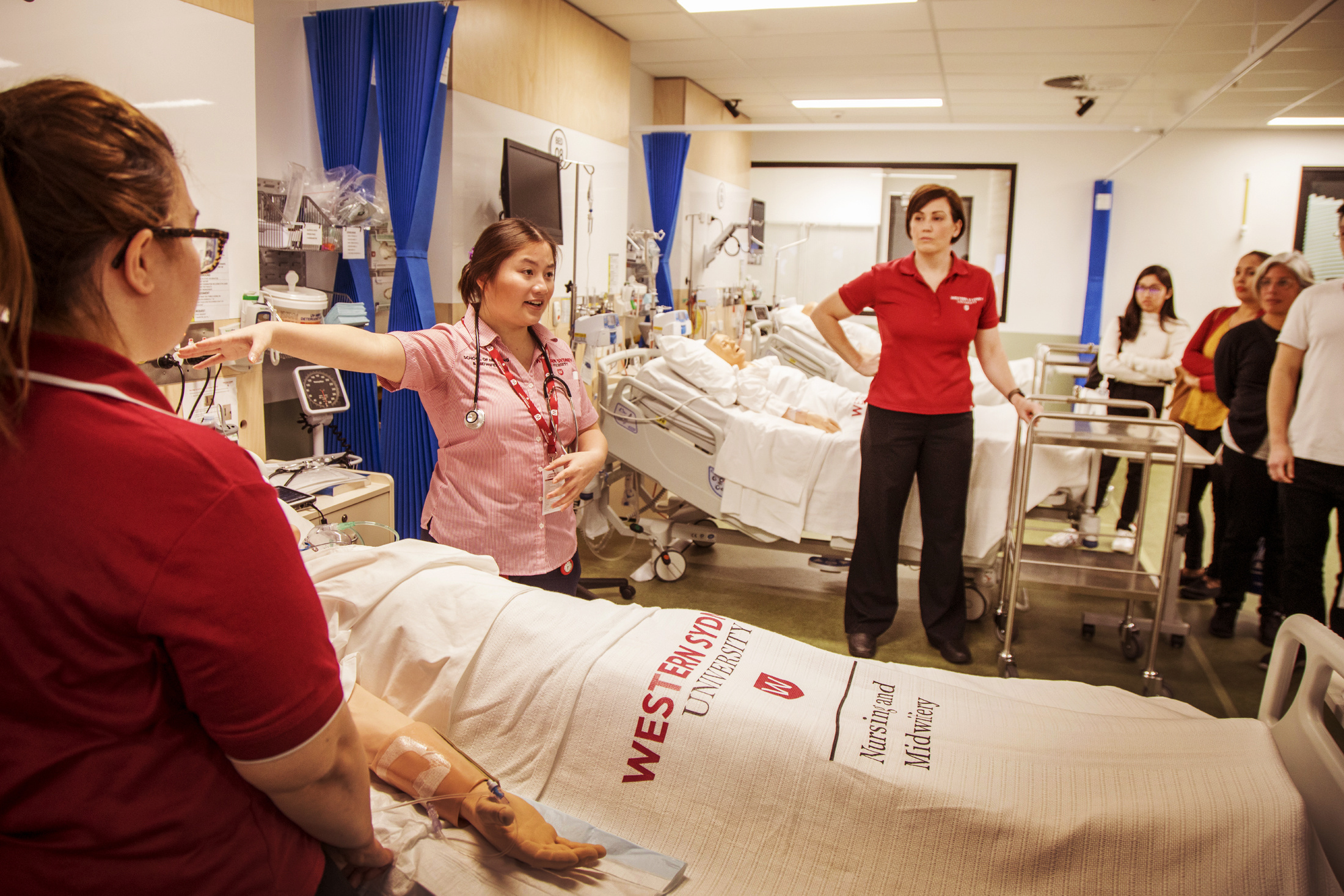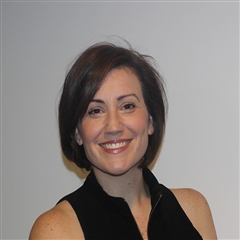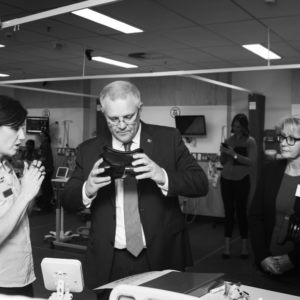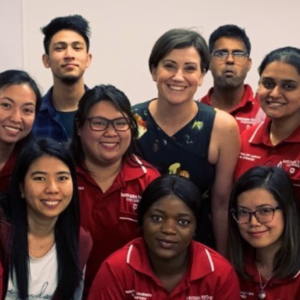Table of Contents
Meet Nursing Lecturer Nikki Meller!
Nikki is an experienced nurse with previous clinical positions in coronary and palliative care and has held concurrent clinical and academic research positions. She is a lecturer within the School of Nursing & Midwifery teaching in the undergraduate nursing programs. Nikki is passionate about building a sustainable and engaged nursing workforce having particular research interests in nurse grief and bereavement, empathy, the influence of new modes of teaching and learning in higher education and graduate employability.
She has a Master of Nursing (Research) & Bachlor of Nursing both from Western Sydney University.
About Nikki
I have always had a passion for helping people. It doesn’t matter which context, whether it is helping family, friends, people in the community, I am one of those people that really enjoys helping. I knew from an early age I wanted to pursue a career where I could help people, but when I left high school and had finished my HSC, I went straight into the workforce. I didn’t want to go to university straight away, as I didn’t know which degree to do, or which area of study to pursue at that point in time.
I trained as a cardiac technician for several years, working in Sydney, before I travelled overseas to the UK, where I was working in London metro hospitals and also rural/county general hospitals as a cardiac tech. Once I had come home back home to Australia, I found myself being pulled towards a career in health care, in particular nursing, and I enrolled in a nursing degree at Western Sydney University (the same place as I now work) as a mature aged student. I have never looked back.
As soon as I entered the course, I knew from day one this was what I was meant to do, this was my career. I have been fortunate enough to work in different hospital environments, different speciality areas, working in clinical research, academic research and now in higher education actually teaching people to be a registered nurse.
What has been the highlight of your career so far?
The highlight of my career so far is being able to do my current job. Working as a lecturer and teaching nurses how to become competent and safe practitioners, is extremely rewarding. When I walk into a tutorial or a clinical practice lab, I feel very lucky to not only teach students but also become their mentor. Being a lecturer is more than teaching, it is about sharing your nursing experiences, your knowledge, your expertise, your leadership; helping students navigate their way from undergraduate to new graduate nurses.
Where do you currently work as a Nursing Lecturer and what inspired you to work in this field?
I currently work at Western Sydney University, School of Nursing & Midwifery. I was working as a palliative care clinical trials coordinator, and I had come across an advertised casual teaching position at the school. I had completed my Master of Nursing degree, and from that postgraduate study, I knew that I wanted to further pursue a role in nursing education. I had really enjoyed clinical education and leadership roles, so I wanted to try an education role at a university level.
How does one become a nursing lecturer? And what does a typical day look like?
To become a lecturer, firstly you might want to do some casual tutoring. There are prerequisite qualifications to come in as a casual tutor, with a combination of clinical experience and postgraduate qualifications. Once you have some experience teaching in higher education, then you can apply for an associate lecturer position or a lecturer position (really depending on experience and qualifications). You need to do further postgraduate study e.g. enrolling or completing a PhD, have a demonstrated commitment to and achievements in high-quality undergraduate teaching in a classroom, and clinical settings, at a minimum.
A typical day includes face to face teaching of students, in the current climate that is either delivered online or on campus. You are consulting with students and helping them with assessment work, giving advice and support about any questions they may have of their learning, talking and meeting with students concerning pastoral care, marking assessments, or helping students navigate their academic progression.
You could have responsibilities such as unit coordination, which means you are creating all teaching and learning materials for that subject, assessment requirements and managing staff teaching in that subject (that’s just a few responsibilities). You may also have other school or university governance roles, or you would be contributing to other school activities related to the enhancement of the environment for students and staff.
What is your current research?
My PhD is understanding how nurses experience grief after the death of a patient in their care. Based on my own experiences as a coronary care nurse and experiencing patient deaths within that environment, I wanted to research this phenomenon further. There is research specifically looking at palliative, oncology or paediatric nurses experiences of grief, but there is limited research on how generalist nurses, who work across all other speciality areas in a hospital environment, experience grief when a patient dies.
Identifying and understanding how nurses recognise and manage their own grief responses when a patient has died, may present an opportunity to better understand how nurses manage and negotiate their own grief reactions, and how organisations can best support these nurses managing their own grief.
Some emerging findings from my research are when a patient has died, nurses cope with the intensity of these emotive clinical situations by ‘putting their nurse face on’. This is a temporary state of being. Nurses reframe their thinking becoming task-focused and clinically practical at the time of a patient death at work, describing acts of emotional control to suppress their grief reactions, usually having five minutes, wiping away their tears, and then getting on with the job.
This ultimately is not healthy for nurses to suppress their grief reactions, and as I have discovered in my interviews of nurses, this suppression of grief felt by nurses has led to unresolved grief, PTSD, and some nurses still grieving the deaths of patients when they talk about them. This reinforces to me, how important my research is to the nursing profession, and how much more we need to do as a profession and individual organisations, to help nurses during these highly emotive times being a professional caring for others.
What is constructivist grounded theory?
Constructivist grounded theory is a type of qualitative research methodology that illuminates the human experience in unity with others, where the construction of knowledge and truth as understood by a group of individuals with whom they share a contextually common experience (Ward, et al., 2015). Presenting the complexities of everyday experiences, the findings of a grounded theory are presented in the participant’s words (Ward, et al., 2015).
Guided by a set of principles and practices, constructivist grounded theory is a research process that acknowledges existing assumptions, is dependent on the researcher and participant relationship, and is evolving and fluid. Central to constructivist grounded theory, and different from classic grounded theory, is how the researcher “constructs” their grounded theory through their perspectives and research practices, as “we the researcher” are “part of the world we study” (Charmaz, 2006).
Drawing from your clinical and academic background, can you talk about grief?
Some practical lessons I have learnt from researching nurses grief is that it is ok to talk if you need to talk. When someone asks, “are you ok?”, it is ok not to be ok. During every interview I have done with nurses talking about their grief experiences, they have spoken about the importance of speaking with colleagues they trust, family or friends, and how it had made them feel supported when they can talk about their feelings.
Our professional responsibilities overtake our personal emotions when we are at work. If we are caring for a dying patient, our 100% focus and attention goes to the patient and their family, always. It is not until after the patient has died and family have left, that is when it is really important for nurses to engage in debriefing and they can to talk about their feelings (this is usually informal conversations).
I am hoping my research will be able to encourage or support more pastoral care and support for nurses in a timely manner, within the clinical context, when they feel personally affected by the death of a patient
What are the main workforce issues you think exist currently in nursing and what needs to be done on a local or systematic or policy level to fix them?
The main workforce issues that exist in Australia’s demand for nurses will significantly exceed supply (with a projected shortfall of approximately 85,000 nurses by 2025). What is needed is improved retention of nursing students within education, improved employment rates following graduation, and increased early-career retention. These issues are not new, they have been identified for years now. As we are coming closer to 2025, we need to be more proactive at every level, to ensure we are building capacity with our nursing workforce but also meeting the demand.
How do we change the culture of incivility and nurses ‘eating thier young’, and improve nursing education?
We change the culture, by making sure we don’t allow it to happen. If we hear someone bullying a student, we should be pulling that person up. If we see someone bullying a student, we should be pulling that person up. It is not ok to continue to accept nurses ‘eating their young’. Cultural change is one of the greatest challenges for any profession. It needs everyone, at every level within the organisation or the profession, to do their part for change to be successful.
When we talk to nursing students, we should be the one’s demonstrating good nursing practice, which includes a positive professional culture. We should be inclusive and supportive. We should be embracing our nursing students and encouraging them to work within their scope of practice under our guidance, teaching them how to be the best nurses they can be.
I must say though, I do think culture is changing. I see it and hear it. I know there are fantastic practitioners, managers, leaders, educationalists, and most importantly many frontline nurses, who are all making significant contributions to positive cultural change. I hope it continues.
Do you think there is a gap in nursing education?
I don’t think there is a gap in nursing education per se, as all education providers are accredited for their courses through ANMAC in Australia. I think there is a need and a demand for education providers to offer additional units of study for students in line with their preferences for specialisation, but also what the profession needs us to include as we educate our nurses of the future.
Speaking on behalf of our School of Nursing and Midwifery at WSU, we offer cross-discipline and interdisciplinary units to our students as elective units. Being a Registered Nurse in Australia in 2020, demands nurses are educated to develop their technological capacity, focus on digital health and be aspirational and flexible.
As we look toward the future of nursing education in Australia, I think there will be more emphasis on the social requirements of our sick and vulnerable, therefore our curriculums will need to reflect these social and professional changes as well as the professional demands of an ever-changing clinical environment.
What factors promote or define a healthy workplace for nurses?
Factors that I think define a healthy workplace include authentic and transformational leadership (I don’t think you can’t be defined by just one leadership style), effective teamwork, being supportive of each other, clear and consistent communication, positive reinforcement, and acknowledgement of staff and their achievements. When a workplace is busy and frantic, it is the small moments that you remember as a staff member.
You remember when your manager steps in and helps, you remember when you were asked if you wanted a coffee, you remember those who supported you when you had personal issues, you appreciate when you asked someone for help and they don’t hesitate to help you. I think the busyness of our workplaces can be stressful sometimes, and if we work in an effective team, we feel well supported, we are able to do our job effectively, and we enjoy going to work each day.
What is one thing you wish you would have known before you started your career in this field?
Be kind to yourself. There are some day’s where you really need to take time out, be kind to yourself and remind yourself that you are doing the best you can.
What are some great resources that have helped you along the way? Or what have you listened to or read recently that has inspired you
Some really great things that have helped me along the way are exercising and finding a mentor. Exercise is great for so many reasons, but I generally walk every day (I’m not much of a runner, so I walk!). Even if it’s only for half an hour, it really helps me mentally and physically. I listen to podcasts or an audiobook and try to take time out for myself. I know some readers may say, I’m on my feet all day, the last thing I want to do is exercise, but really any type of exercise whether it is walking, running, swimming, yoga, Pilates, weights.. it doesn’t matter, it all helps unwind the mind and release those endorphins.
Also finding a mentor. I have been very fortunate to have come across a few mentors throughout my career so far, and each of them has helped me navigate my way through my career. I truly wouldn’t be where I am today without their support and encouragement. Mentors come in all forms, they aren’t necessarily someone in a titled position. Someone that you can talk to openly and honestly, and someone who has had experience in the areas that you would like to be mentored.
Who are the 3 people who have been most influential to you and why?
My husband, my daughter, and my son. My husband’s unconditional support has given really given me the time I have needed over the years to do all the extra work I have needed to do to be as successful as I have been. I was pregnant with both my daughter and son when I was studying to be a nurse, so they have both been through my nursing journey with me from the very start.
I was pregnant on clinical placements, breastfeeding on breaks, taking them to uni classes, then working full time with two children under 18 months of age. Looking at them now, and the love and support they give me every day influences me to be the best person I can be every day for others that need my support.
What is your leadership style?
I am a combination of authentic and transformational leadership styles. I am self-aware, I lead with a vision, I have integrity, I am consistent, and I am supportive of my staff. I am adaptable, flexible, and I am inclusive. I value everyone’s contributions. I am really passionate about being a good leader. To be a good leader though, you need to be humble, be resilient and be emotionally intelligent. To be the best leader I can be, I constantly work on my own professional development and try to always improve the ways in which I lead, so that my team and those that I lead, get the best out of my leadership.
How can we work better with other health professionals in the multi-disciplinary environment?
We can work better by being kind, honest, efficient, and good communicators. Working within teams of people, not necessarily the same team all the time, requires us all to be responsible for our actions within the team. As patient safety is at the core of our everyday practice, working better together is really important and if we all play our part in the team, this helps with creating a positive workplace culture, improved patient care and our own positive attitude towards our work.
Can you think of a really funny situation you’ve had while working?
I can think of many a funny situation… When nurses tell stories, they are always funniest when there is plenty of detail. I won’t elaborate too much, but when you ever have a patient(s) with gastro next… remember your PPE. I don’t mean an apron… protect your face at all times! I was in the wrong place at the wrong time… that’s all I will say.
Are you an Aussie healthcare professional who would like to write about your area of speciality, unique experiences or other nursing related content then please email us at hello@thenursebreak.org to discuss further or check out the Write for TNB Info Page on the website.









You must be logged in to post a comment.